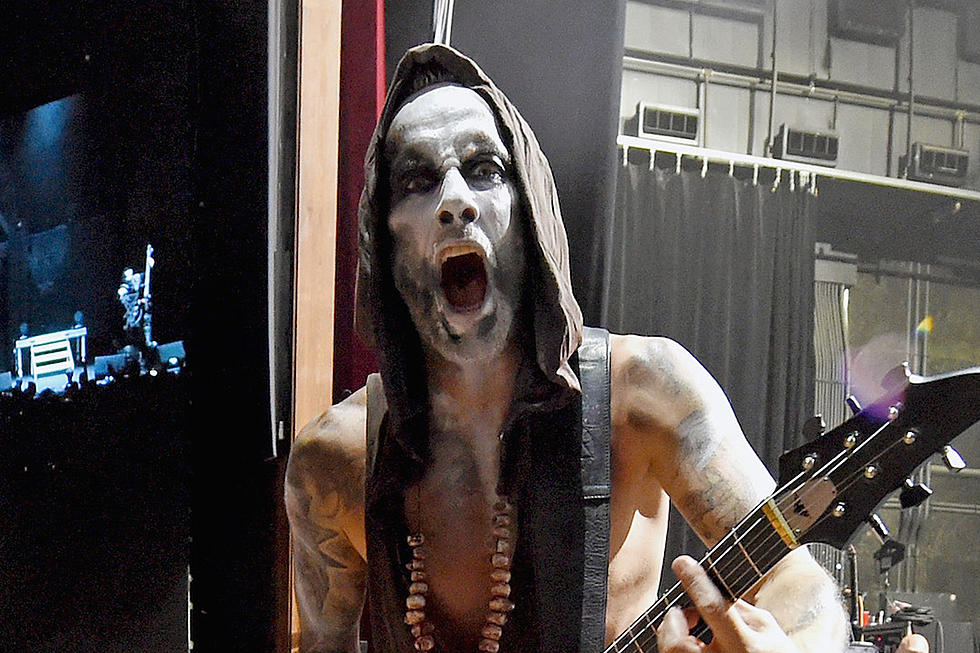Behemoth’s ‘The Satanist’ Is the Metal Album of the Decade – Full Documentary
Behemoth’s The Satanist is a vile masterpiece, and it’s Loudwire’s pick for the Metal Album of the Decade. To delve deeper into the landmark album, Nergal’s battle against the Polish government, his victorious fight against cancer and more, we traveled to Warsaw to spend a day with the Behemoth frontman.
After Nergal cooked us breakfast, we went straight into his personal philosophy on music. “I suggest, strongly, that art should be exterritorial,” Nergal begins. “[National Socialist] black metal was strong in Poland and already back then, when I was a teenager, I felt it was wrong. It’s no place for politics; I don’t want to be part of it.”
Politics became a major part of Nergal’s life, however, in the early 2010s when he was charged with blasphemy after tearing up a Bible onstage. For his act of desecration, Nergal faced two years in prison, with the case going all the way to the Polish Supreme Court.
“Divide and rule; that’s the ancient formula — divide et impera. That’s what the Polish government does ... I’m one of their favorite scapegoats and enemies.”
During this time, Nergal was also battling cancer, appearing on The Voice of Poland as a judge and dating famous Polish pop star Doda. All of these events, mixed with the upcoming 2011 Polish election, turned Nergal into his home country’s most vilified and controversial public figure.
With the country’s most infamous Satanist appearing on nationwide television, various groups began to use Nergal as a political prop, demonizing the musician to push their own agendas.
One study even found that Nergal went from being mentioned just 61 times in the Polish media during 2009, to 2,755 times in 2011. “Shifts in meaning, context changing, hyperbolization and generalization were also used to supersede the religious category of the neighbor by the political category of the enemy,” writes Adam Warzecha.
“Divide and rule; that’s the ancient formula — divide et impera. That’s what the Polish government does,” Nergal explains. “They need enemies and they need scapegoats, and I’m one of their favorite scapegoats and enemies.”
“You’re gonna put a sentence on me for being abnormal, different; calling me a public enemy, evil incarnate.”
“Regularly, I’m being called to court or to interview with the police. It’s insane, just leave me alone. I’m not asking for immunity here, I’m just asking for protection. Protect me from opportunists and idiots. Poland, please protect me, I need you. I give away a big chunk of what I earn so you can raise your schools; unfortunately you can raise these motherfucking churches. You’re gonna put a sentence on me for being abnormal, different; calling me a public enemy, evil incarnate. Well, it’s cool metaphors, but honestly, am I one? I don’t think so.”
“With my art being radical and music being extreme and so on… it’s supposed to be violent and evil and I need those metaphors to express my disgust, my frustration towards those institutions and objects that, to me, are the HIV of today’s world.”
“I had one-and-a-half liters (of fluid) stuck in my lungs."
Nergal also discusses his battle with cancer in detail, explaining how its physical form was growing in the middle of his chest. “When I was breathing, I was whistling. It was kind of funny,” Nergal recalls. “I had one-and-a-half liters [of fluid] stuck in my lungs. They would just drill a pipe through my ribs, straight to my lungs. I’d be walking with a can for two days.”
“When I got to the point with my brain and my body that I was able to fight back those surreal accusations, it was like, ‘Okay. Round Three [in] the ring, Nergal. Kick the shit out of those idiots’… and that’s what I did.”
“It was just a manifestation of self-empowerment and perseverance. It just couldn’t (have) come out better.”
While exploring the city of Warsaw and Nergal’s own Barberian barber shops, the Behemoth leader went into the creation and recording process of The Satanist.
“With The Satanist, we finally started to explore the gaps, the pauses,” Nergal reveals. “I always said, ‘Guys, The Satanist is not going to be faster than Evangelion; it’s probably not even going to be heavier that Evangelion, but it’s more human, it’s more organic.’ So coming out with that record throughout obstacles and problems, it was just a manifestation of self-empowerment and perseverance. It just couldn’t [have] come out better.”
“Is Behemoth’s music original? Fuck no. Is Behemoth’s music unique? I truly hope so. Is our music one-of-a-kind? I truly hope so. Don’t mix that with originality; this does not exist, this word is not in my dictionary, but I do believe in uniqueness of art. I do believe in individuality.”
Watch our full documentary feature, The Satanist of Warsaw, with Nergal in the video above. Click here to grab a copy of The Satanist and click here to pre-order Behemoth’s upcoming live album, Live from Maida Vale.
Special thanks to Polish filmmaker Ola Kardynal and video editor Brad Hanford.
The 66 Best Metal Songs of the Decade: 2010 - 2019
More From KLAQ El Paso



![40 Most Offensive Band Shirts [Very NSFW]](http://townsquare.media/site/366/files/2021/12/attachment-Municipal-Waste-Trump-Shirt.jpeg?w=980&q=75)






